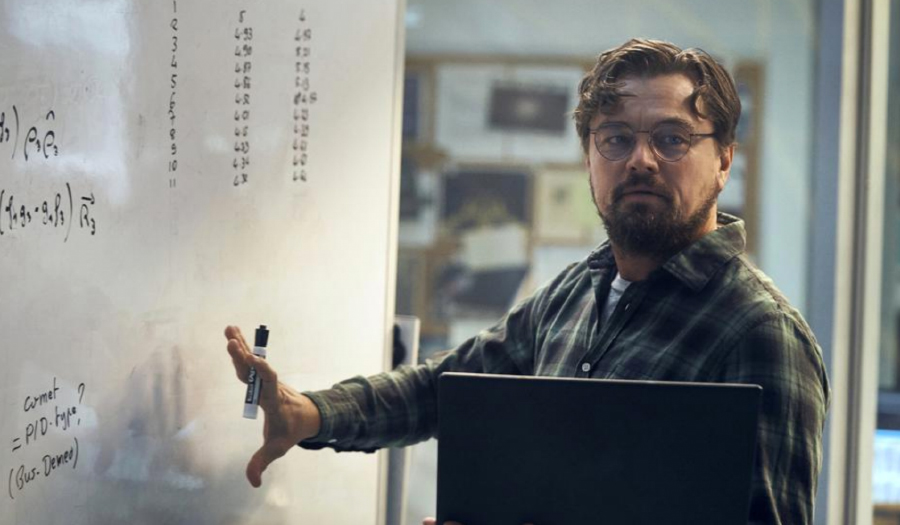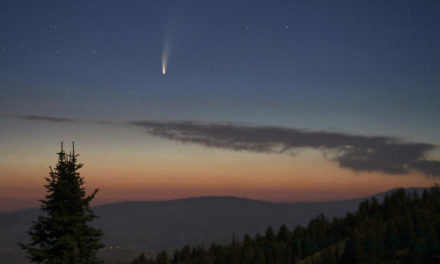(AP) – Leonardo DiCaprio has been an outspoken environmental advocate for as long as he’s been famous. But while he’s produced documentaries, contributed millions to the cause through his foundation, sat on several relevant boards and even used his Oscar speech to talk about climate change, the topic has never overlapped with his acting work.
It wasn’t for lack of trying: He just couldn’t find the right fit. And, more importantly, he didn’t want to do the wrong thing either.
Then Adam McKay (“The Big Short”) came knocking with an idea he’d been developing with journalist David Sirota: What if it wasn’t explicitly about climate change, but a comet? That DiCaprio found interesting.
The result is “ Don’t Look Up,” a star-studded end-of-the-world satire hitting Netflix on Dec. 24. DiCaprio and Jennifer Lawrence play scientists who discover the extinction level comet and…no one cares.
McKay and DiCaprio spoke to The Associated Press about the film and trying to entertain and get a message through without alienating too many people.
AP: Leo, how did you decide this was the one?
DiCAPRIO: The brilliance of this screenplay is the analogy of making it a comet that is going to wipe out mankind within a six-month timeframe created this massive sense of urgency, rather than some slow-moving climate behemoth narrative. It really came at this specific moment in time, like films like “Network” or “Dr. Strangelove,” that really encapsulates what we’re going through as a culture. It perfectly held a mirror to our society and how we deal with the climate crisis, that we just let it continue and don’t take the actions that we need to take in order to survive on this planet.
AP: I read that you two spent five months going over the script.
McKAY: There’s nothing I love more than having my script or a cut of the movie challenged in a thoughtful way. Leo came in the edit, too, and I would show him unfinished cuts. He gave terrific notes. The guy’s worked with some of the great directors of all time, you know, Scorsese and Tarantino, these grandmasters, and he knows a thing or two about story and film.
AP: Do you remember any big debates from these sessions?
DiCAPRIO: My motivation was (to) give a voice to the scientific community, to the people who’ve been devoting their life to the climate crisis and how their voice feels marginalized. I’m much more literal about a lot of these things. I wanted to bring politics and specificity and direct linkage to climate in a lot of these speeches that we did. It was amazing to be able to have a partner like Adam in that process who kept on stripping away specifics that would make certain people that are in the audience feel alienated, that made it political.
McKAY: It’s interesting, some of the words that Leo and I would debate, like the word “fact.” You want to just say facts. And I was like, “Leo, I hate to break it to you, I think they politicized the word fact.” So there was this constant vigilance over what words we were using. We just tried to stay out of the nonsense, the talking points, the focus groups, the clicks, the ratings.
DiCAPRIO: As soon as we stripped away a lot of those words too, it just made it more human.
AP: Was it cathartic, getting to yell into the void in a way in a “mad as hell”-style speech?
DiCAPRIO: Well, look, I’m not a climate scientist, but I tried my best to think of a lot of these people in their frustration.
AP: Randall and his midwestern unassumingness is pretty different from other characters you’ve played.
DiCAPRIO: It was it was a fascinating journey because, yeah, I’m in scenarios wherein a Jonah Hill or a Meryl Streep is attacking me and I had to constantly swallow things that I wanted to say on a personal level and just bite the bullet and take the insult and the kick in the nuts. Even when Ariana Grande says what she says to me, I had to fight that instinct. It was a very, very unique experiment in patience and sitting in discomfort, which is something that I love in movies, if, when done correctly, when you can make the audience feel uncomfortable for you as a character. I think back to “King of Comedy” or “Taxi Driver.” It’s a hard thing to pull off. I don’t know if I did it or not, but that’s what I was definitely aiming for.
McKAY: I mean, I loved it. I just thought it was so cool to see a guy who you’ve seen like, fight a bear in like giant sprawling epics and lead of the biggest movie ever made and to see him having a panic attack or having to take a quarter of a Xanax and getting run over by this fame.
AP: What have you thought of audience responses so far? Are people getting what you hoped from it?
McKAY: The big thing was that we wanted to make it funny. I would see the crowd laughing through the whole movie and then I would look at the cards (at test screenings), and it almost seemed to defy people who would identify as conservative, liberal and that was very heartening to me. There was always going to be a couple of people that are mad about something.
DiCAPRIO: You never know ultimately how a movie will impact a mass audience, but a little test case for that: I have very liberal hippie parents that walked out of that theater, both my mother and my stepmother went to the premiere, and be like, “I’ve got to tell you, I really identified with a lot of the characters in that movie. I mean, I was thinking about some of my actions. I was thinking, am I like Meryl Streep?”
McKAY: No! Are you serious?
DiCAPRIO: I’m like, “Mom, you’re nothing like that character.”
Leonardo DiCaprio in Don’t Look UP










